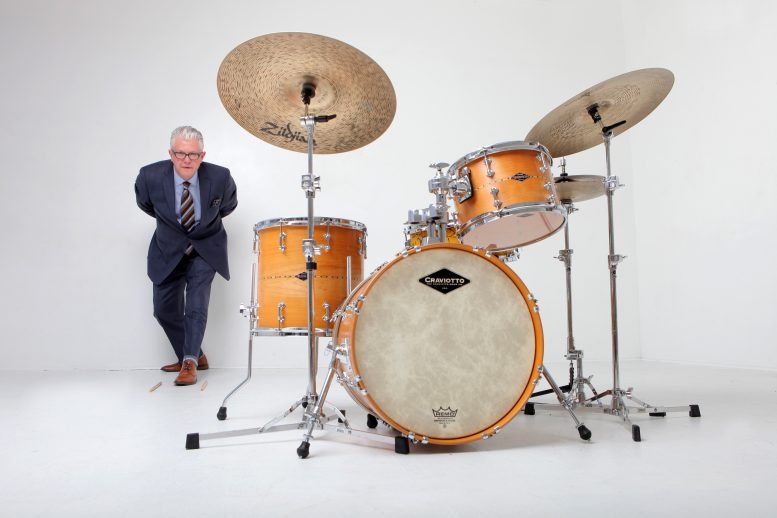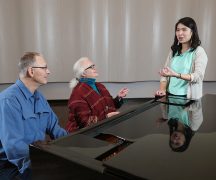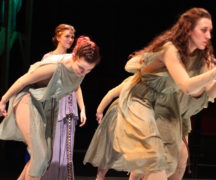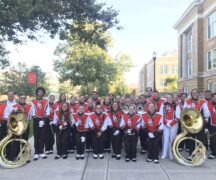By DAVID DUPONT
BG Independent News
Matt Wilson is in the middle of it all.
And the jazz drummer and composer wouldn’t have it any other way.
As much as the music, he said in a recent telephone interview, he was drawn to the jazz community.
Wilson remembers as a teen going to festivals and watching in awe at the interaction among the performers.
“I just saw the way players greeted each other … how they talked and showed their love and asked about families. I’d sit and see that from a cloud. Now I’m part of it. I love the social aspect.”
The 54-year-old musician has gone on to play and teach with many of those he first admired, and he also passes that sense of community on to a new generation, not just as a teacher but as a fellow musician.
Now he’s sometimes the oldest musician on the stage.
This week Wilson will interact with the students at Bowling Green State University during a four-day residency. His visit will culminate in a performance with the jazz faculty and the Jazz Lab bands at 8 p.m. in Kobacker Hall. Tickets in advance are $7 and $3 for students from bgsu.edu/arts or by calling 419-372-8171. All tickets are $10 the day of the performance.
Wilson said his mother attributes his playing drums to his childhood. He was born with a clubfoot. Because of the treatment to correct the problem, he couldn’t run around. He’d be seated in one place with toys around him, like a drum set. And he used his imagination to find new ways to play with his toys. That approach to drums have earned him the respect of his peers. In 2017 he was named Musician of the Year by the Jazz Journalist Association.
His parents played a lot of music, not necessarily jazz, but instrumental music.
Then he saw Buddy Rich on an episode of “The Lucy Show” in the 1970s, and he was hooked.
“I liked the look. I liked the energy,” he said. “I liked the way to brought people together.”
Wilson started learning drums on his own. When he did start taking lessons, he found a teacher who was more interested in teaching music rather than just the rudiments of drumming.
So when he was showing Wilson a bossa nova beat, the teacher would play along on bass.
Budget cuts had taken their toll on his school’s music program. It had a band, but no jazz ensemble.
He and his brother, a saxophonist, would by sheet music and play duets. They’d play for 4-H and PTA meetings, complete with some comedic schtick.
“I had to go in the community,” Wilson said. “I was around older musicians who gave me really great guidance.”
Staring in his early teens he worked a number of jobs at weddings and dances.
Once he was playing with a pianist at a nursing home. After the tune she asked: “We were playing ‘Sweet Georgia Brown.’ What were you doing?”
Playing a solo, he said, taken aback. “I knew I had to play the song like everyone else.”
Performing in a rock band that played original material taught him how to come up with drum parts when he didn’t have a recording as a model.
Though he grew up in rural Illinois surrounded by cornfields, he was able to seek out performances by his heroes. He remembers one week where he and a friend, now a doctor, got to see the Count Basie Orchestra, Dizzy Gillespie, and Oscar Peterson.
When he started studying music at Wichita State, that playing experience served him well, and he was able to work a lot.
“I was fortunate to apprentice with older musicians and I still try to,” he said, though he’s a veteran himself.
He has 13 albums under his belt as well as extensive contributions as a sideman. His most recent is “Honey and Salt,” a recording inspired by the poetry of fellow Illinoisan Carl Sandburg.
Now he teaches at the New School with musicians such as trumpeter Cecil Bridgewater, drummer Andrew Cyrille and soprano saxophonist Jane Ira Bloom whom he listened to when he was young.
Wilson said when he talks about the community he always capitalizes the “U” because “unity” is in the middle of community.
“That’s why I love teaching,” he said. “I really want to help serve the needs of the music…. It’s beyond just playing sounds on the drums. It’s the family experience.”
He experience this himself in a profound way in 2014 when his wife died of leukemia leaving him with four teenaged children, an older daughter and triplet sons.
“The way the community rallied to support me is really unbelievable. That set it to another level.”
Recently a young saxophonist approached him with questions about how to balance family and the demands of a performing career. Wilson is proud that younger musicians trust him enough to seek his guidance. “I love that aspect of it.”
He’s optimistic about what student musicians will face. Any field, he said, has challenges. The best chefs, the best engineers, the best car mechanics all share a passion for what they do.
“We’ve all had to create new paradigms about how to approach things.”
Dreams have to be backed up with hard work. For the jazz musician uncertainty is a given. “Rehearsal is just a way of getting ready for the unexpected.”
That builds a level of trust in fellow musicians and yourself, he said, and those interpersonal skills are valuable no matter what the student ends up doing.
Life’s like that, Wilson said. “I don’t have a plan. The plan is we’ll let life unfold the way it will.”
He knows the uncertainty of an arts career from the parent’s point of view. His daughter majors in musical theater at The Hartt School, the conservatory at the University of Hartford. He’s confident she’ll be successful. “She’s already successful.”
One positive trend Wilson has noticed is more musicians are staying local and building up regional scenes. That’s true throughout Ohio and beyond.
There’s also a greater sense of unity among those who perform, book, and record the music.
Social media and the internet certainly presents a challenge proving a flood of free music. But, Wilson said, it also provides great exposure for “the underground arts.”
That YouTube video of a concert is fine. But “no matter what happens, nothing will replace the human moments at a concert,” Wilson said.
“When you’re there, you’re part of it. You’re part of that sharing. … We have to believe in that power.”





